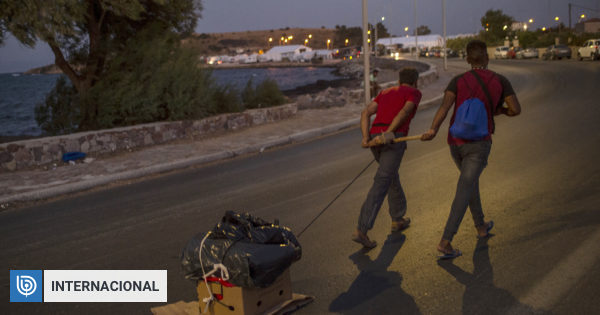
[ad_1]
After a morning police operation, the streets and parking lots near the ruins of the burned camp in Moria, on the Greek island of Lesbos, on Thursday thousands of migrants were progressively emptied they slept in the open air for a week, and 5,000 are already in the new place assigned to them, according to authorities.
“We were free and now we are going to be locked up again,” Mustafa, a Sudanese refugee, complained to Agence France-Presse.
“Even if you don’t want to go to the camp, they will force us,” says Abdul Sabu, an Afghan migrant. “We must go there, otherwise our asylum claim will be rejected,” added compatriot Fahim Sharifi.
Thousands of exiles, on the streets since the fire that destroyed Moria on the night of September 8 to 9, were awakened by the police to be transferred to the new camp, “provisional” according to the authorities.
Thousands of migrants were wandering the roads of Lesbos after the fire.
At noon, several hundred people were waiting in front of the new camp, an AFP journalist found.
The migrants, loaded with packages, some with strollers, others dragging boxes full of objects, entered the compound, where they had to pass a covid-19 diagnostic test.
The police, who blocked Médecins Sans Frontières (MSF) and journalists from entering the area, began to pass tent by tent, waking up the migrants to take them away.
“Migrants are transferred from the street to the new structure, from abandonment to medical care, from sanitary risks to public health control,” said the Minister of Civil Protection, Michalis Chrysochoidis, present during the operation.
Until now 5,000 migrants were in the new camp, of which 135 tested positive for the coronavirus, Migration Minister Notis Mitarachi said Thursday afternoon.
It will take “a few days” to transfer the other 7,000, the minister told reporters outside the camp. This initiative “responds to humanitarian purposes” and “will continue” throughout the day, added the minister.
Eight non-governmental organizations (NGOs) regretted that legal aid is not being provided in the new camp, despite the restart of asylum claim procedures and interviews for this purpose by teleconference.
“Neither asylum seekers nor legal support organizations have information about the infrastructure for now,” the NGOs stressed.
Some 70 policewomen participated in the operation. In videos released by the police, women in white uniforms are seen speaking with families and refugees.
Exhausted
Moria, the largest migrant camp in Europe, created five years ago in the middle of the migration crisis, he was totally devastated by the fire. Six young Afghan migrants were arrested, four of them charged with “voluntary arson.”
The Greek authorities and the UN built a new camp since Saturday where, according to them, asylum procedures can be resumed. But at first the majority of migrants refused to settle in the new compound because they feared being blocked for months while waiting for a possible transfer to the continent or another European country.
However, after a week of wandering in the open under a scorching sun, without bathrooms, the migrants began to head towards these facilities.
On Wednesday night 1,000 tents were set up, each with a capacity of 8 to 10 people. In the compound, medical areas have yet to be built and two quarantine areas are planned, since several cases of covid-19 have been registered.
The objective of this new, “provisional” camp, is that refugees “can, gradually and calmly, leave the island and go to Athens “ or “to be reinstated in another place”, said on Wednesday the representative of the UN Refugee Agency (UNHCR) in Greece, Philippe Leclerc.
“UNHCR calls on the (Greek) authorities to speed up the (asylum application) processes so that people don’t stay here too long,” he added.
Michalis Chrysochoidis estimated, for his part, that half of the migrants from Lesbos will be able to leave the island “between now and Christmas” and the rest “around Easter”, that is, at the beginning of April.
[ad_2]